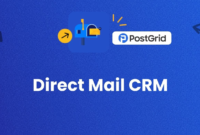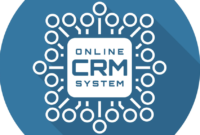CRM with Email: Streamlining Communication and Relationship Management
Introduction
Customer Relationship Management (CRM) systems have evolved into indispensable tools for businesses. One of the most vital integrations within a CRM system is email functionality. By combining CRM with email, companies can manage customer interactions more efficiently, enhance communication, and foster stronger relationships.
This article explores the benefits, features, and best practices of CRMs with integrated email capabilities and highlights the best tools available for businesses of all sizes.
What is a CRM with Email Integration?
A CRM with email integration combines the power of customer data management with email communication tools. It enables businesses to manage email campaigns, track customer interactions, and access email conversations directly from the CRM platform.
This integration eliminates the need to switch between multiple tools, streamlining workflows and improving team productivity.
Benefits of CRM with Email Integration
1. Centralized Communication
All email interactions are stored in one place, providing a comprehensive view of customer communication history.
2. Enhanced Productivity
Teams can draft, send, and track emails without leaving the CRM, reducing time spent on administrative tasks.
3. Personalized Communication
Access to detailed customer data allows for tailored email campaigns that resonate with individual recipients.
4. Improved Collaboration
Team members can view email exchanges, ensuring everyone is on the same page when interacting with customers.
5. Email Tracking and Analytics
Integrated email tracking provides insights into open rates, click-through rates, and response times, helping businesses refine their strategies.
6. Automation Opportunities
Automated follow-ups, email scheduling, and templates make it easier to maintain consistent communication with customers.
Key Features of CRMs with Email Integration
1. Two-Way Sync
Sync emails between the CRM and email platforms like Gmail or Outlook, ensuring all communication is captured.
2. Email Templates
Pre-designed templates for common messages save time and maintain consistency in communication.
3. Campaign Management
Tools to create, send, and monitor email campaigns directly from the CRM.
4. Lead Scoring and Tracking
Track customer engagement through email interactions to identify high-potential leads.
5. Automation
Features like automated follow-ups, reminders, and drip campaigns enhance communication efficiency.
6. Integration with Other Tools
Seamless integration with marketing tools, calendars, and analytics platforms to streamline workflows.
Best CRMs with Email Integration
1. HubSpot CRM
- Key Features:
- Built-in email tracking and scheduling.
- Templates for quick email creation.
- Integration with Gmail and Outlook.
- Detailed email performance analytics.
- Why It’s Great:
HubSpot CRM offers powerful email tools for free, making it an excellent choice for small businesses.
2. Zoho CRM
- Key Features:
- Email integration with Gmail, Outlook, and more.
- Automated workflows for email campaigns.
- Analytics to track open and click rates.
- Customizable templates and personalized messaging.
- Why It’s Great:
Zoho CRM provides robust email capabilities within an affordable package, suitable for businesses of all sizes.
3. Salesforce CRM
- Key Features:
- Advanced email tracking and campaign management.
- Integration with major email platforms.
- AI-powered insights for personalized communication.
- Comprehensive analytics.
- Why It’s Great:
Salesforce CRM is ideal for large enterprises looking for scalable and advanced email functionalities.
4. Pipedrive
- Key Features:
- Email syncing and tracking.
- Customizable templates for outreach.
- Integration with Gmail and other platforms.
- Visual sales pipeline to track email-based leads.
- Why It’s Great:
Pipedrive offers user-friendly email tools that are perfect for sales-focused teams.
5. Freshsales (Freshworks)
- Key Features:
- Built-in email integration for Gmail and Outlook.
- Email tracking with engagement metrics.
- Automation for follow-ups and drip campaigns.
- AI-powered insights for lead prioritization.
- Why It’s Great:
Freshsales is designed to enhance productivity with easy-to-use email tools and automation features.
How to Choose the Right CRM with Email Integration
1. Understand Your Needs
Determine your priorities, such as campaign management, email tracking, or automation.
2. Consider Team Size and Budget
Choose a CRM that fits your team size and financial constraints. Some CRMs offer free plans for small teams.
3. Evaluate User Experience
Opt for a CRM with an intuitive interface that your team can easily adopt.
4. Look for Scalability
Ensure the CRM can scale as your business grows, with advanced features available in paid tiers.
5. Check Compatibility
Verify that the CRM integrates seamlessly with your existing email platform.
Best Practices for Using CRM with Email
1. Keep Email Lists Updated
Regularly clean and update your email lists to avoid sending messages to outdated or inactive contacts.
2. Leverage Templates
Use templates for frequently sent emails to save time and maintain consistency.
3. Track Engagement Metrics
Monitor open rates, click-through rates, and other metrics to refine your email strategy.
4. Personalize Content
Use customer data to craft personalized messages that resonate with your audience.
5. Automate Where Possible
Automate repetitive tasks like follow-ups and reminders to free up time for strategic activities.
Conclusion
Integrating email functionality into your CRM system is a game-changer for businesses looking to streamline communication and enhance customer relationships. From managing campaigns to tracking interactions, CRMs with email tools offer an efficient and effective way to connect with customers.
By choosing the right CRM and following best practices, businesses can optimize their communication strategies, boost productivity, and ultimately drive growth. Whether you’re a startup or an established enterprise, a CRM with email integration is a valuable asset for modern customer relationship management.




